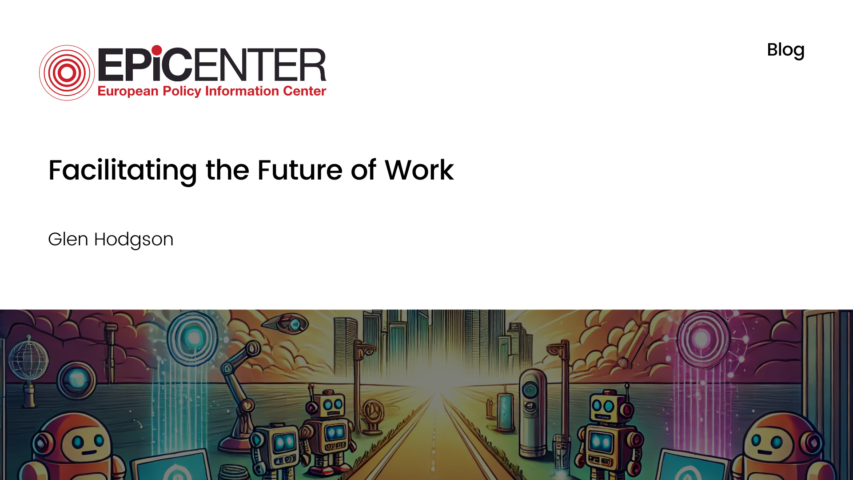Facilitating the Future of Work

Facilitating the Future of Work
Glen Hodgson // 23 January 2024
The landscape of work is swiftly transforming; it is veering away from traditional employment structures characterised by fixed contracts, physical office setups, and rigid hierarchies. Instead, a more adaptive, project-based workforce is emerging, marked by a blend of in-house staff, consultants, and freelancers. This shift is not merely a trend but also a response to the evolving needs of businesses in a digitally driven era.
Europe – despite record-low unemployment rates – grapples with a pressing skills crisis. Reports indicate that over three-quarters of companies struggle to find candidates with the requisite skills, and this reality is particularly evident in the digital sector. Shockingly, data reveals that 40 per cent of adults lack basic digital skills, emphasising the urgent need for a re-evaluation of educational and professional paradigms.
Embracing digitalisation
A recent study titled ‘The Future of Work Study 2023: Digitalisation and the Labour Market of Tomorrow’ identified critical themes and trends in work, urging European leaders to address them proactively. Three predominant themes emerged: harnessing the power of digitalisation, acknowledging the disruptive role of AI, and embracing lifelong learning.
The potency of digitalisation is undeniable. Companies and individuals alike are embracing remote work and digital tools, reflecting the evolving ‘as-a-service’ trend. Yet, amidst this transformation, there is a vital need to recognise the burgeoning opportunities within new business models and industries spawned by digitalisation. Legislators need to adopt a light touch to regulation and allow the market to decide on the technologies, services, and applications that will thrive, rather than picking winners and allocating taxpayer money towards the promotion of pet projects and vested interests. The EU’s fondness for dirigiste industrial policies and excessive regulation is something that must be reversed. Policymakers must engage with freelancers, platform workers, and entrepreneurs to comprehend this changing landscape and craft a supportive legislative framework.
Breaking free from antiquated perceptions of the labour market is crucial to unlocking economic and social potential. The current approach of the European Parliament to the proposal for a ‘Directive on Platform Economy Worker Rights’, for example, reflects the outdated and destructive method adopted by many decision-makers who are mired in the past. Embracing the evolution of work necessitates a departure from the negativity often associated with project-based activities and the fostering of an environment that encourages growth and innovation.
Artificial Intelligence (AI) is a pivotal force reshaping industries and roles. Individuals must collaborate symbiotically with machines to maintain their relevance in the swiftly evolving job market. Simultaneously, organisations need to integrate AI into processes to maintain competitiveness and streamline operations efficiently. The EU AI Act, adopted in December 2023, is of concern, since it sets out to dictate the future path of the technology rather than let innovation and the market decide its evolution. Measures to prohibit the deployment of AI systems deemed to pose an ’unacceptable risk’ in the EU smack of excessive meddling in the development of a fledgling technology. The same goes for requirements in the EU AI Act to publish detailed summaries about the content used to train AI systems and the preparation of technical documentation related to the use of the models. A hands-off, regulatory approach would better serve EU business, consumers, and the economy as a whole.
The need for lifelong learning
Moreover, lifelong learning has ceased to be a mere buzzword: it is an imperative reality. Reskilling and upskilling are indispensable components for success in this new labour market paradigm facilitated by technology. In this vein, education systems across Europe face a pressing need for reform. The youth must be equipped with skills and expertise aligned with the demands of the evolving labour market. However, the educational realm remains entrenched in traditional methodologies, necessitating a sweeping transformation at all levels. Recruiting competent and engaged educators with the right skill sets is pivotal in empowering workers and citizens for the future.
We stress that the digitalisation of the labour market is not the harbinger of a dark, dystopian future but an avenue of opportunity for individuals and economies to adapt, thrive, and redefine work in a rapidly changing world. To seize these opportunities, systemic changes are imperative; the ways of the past should not be a barrier to the potential of the future.
In conclusion, the future of work demands a comprehensive reevaluation of established norms, a proactive approach to digitalisation, an acceptance of AI’s transformative role, and an unwavering commitment to lifelong learning. Embracing these changes will not just redefine work but also pave the way for a more agile, resilient, and prosperous future for all stakeholders in the labour market.
Glen Hodgson is the Founder & CEO of Free Trade Europa
EPICENTER publications and contributions from our member think tanks are designed to promote the discussion of economic issues and the role of markets in solving economic and social problems. As with all EPICENTER publications, the views expressed here are those of the author and not EPICENTER or its member think tanks (which have no corporate view).



